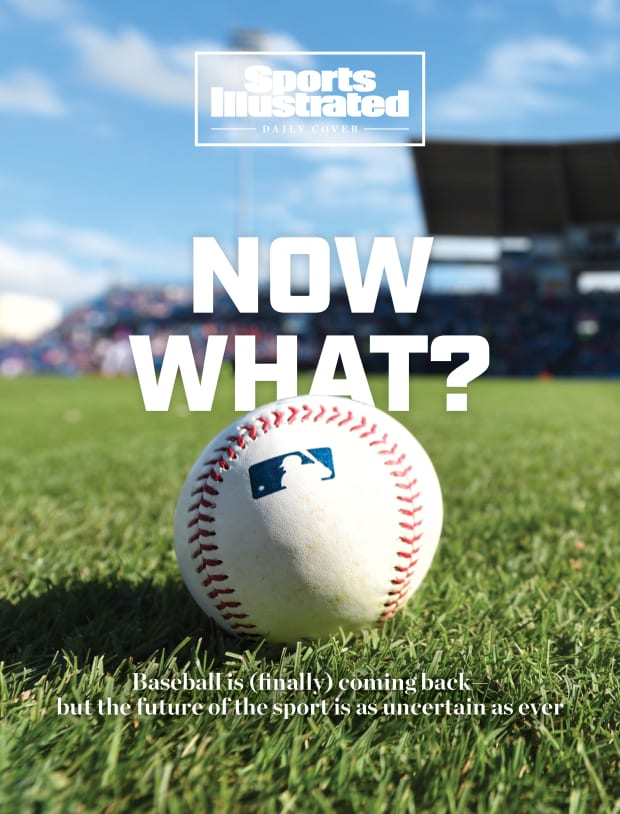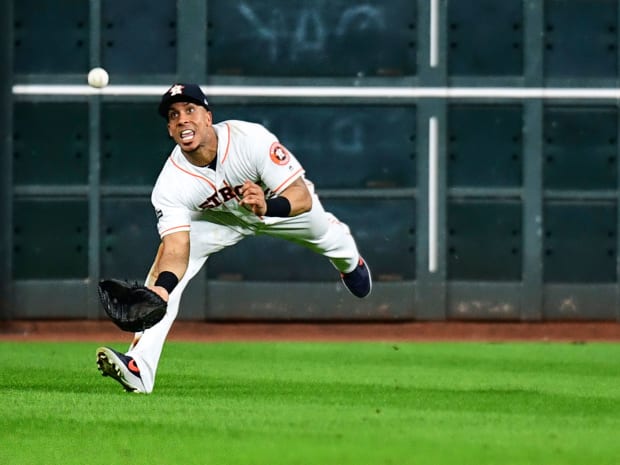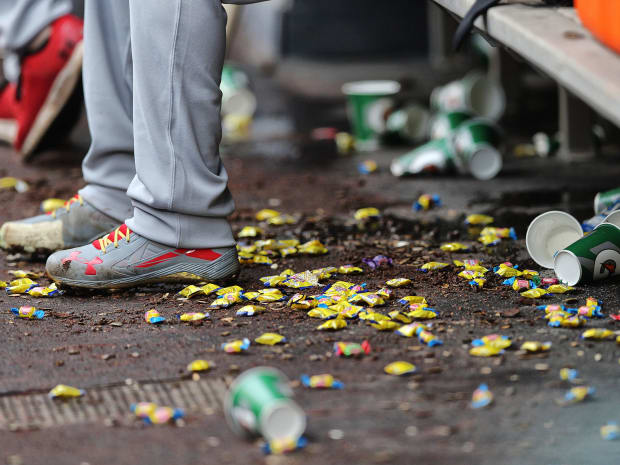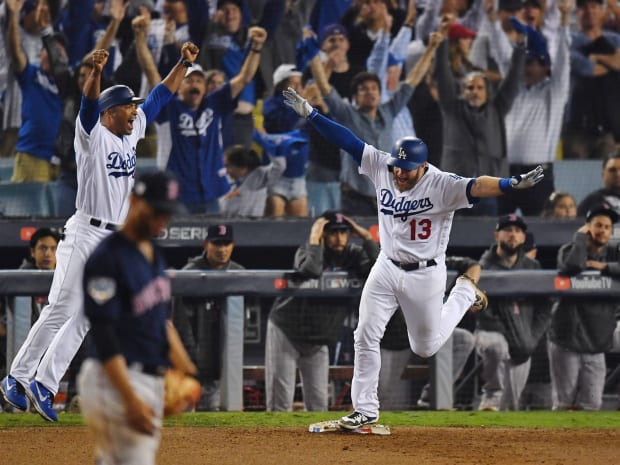The sport is facing more questions than ever about its season—and its future.
Let’s be clear upfront: Nobody really knows how baseball in the time of COVID is going to play out. It’s the small-sample season. Thirty-two wins may get you into the playoffs, which means at least 20 teams have a shot. (The White Sox, Rockies, Rangers and Giants all won at least 32 out of 60 at some point last year.) We might get a Rays-Padres World Series. The most unpredictable season ever staged has the potential to be extremely fun precisely because it doesn’t fit the norms established over history.
With players returning to training next week at major league ballparks, and with Opening Day in play for either July 23 or 24, there are as many questions about this unprecedented season as there are relief pitchers who throw 95 mph. To help you get ready for this return to play, here are the 10 most pressing questions and answers about what baseball during a pandemic might look like.

1. Will we even have a season?
COVID-19 doesn’t care about plans. Cases of the virus are surging to record levels just as Major League Baseball plans to get back to work. More than a third of MLB teams, 11, are in the hot-spot states of Florida, Georgia, Texas, Arizona and California. Between 4,000 and 5,000 players and staff personnel will be tested upon reporting to spring training 2.0 next week. Be prepared for scores of positive test results.
Said one general manager, “I think it’s 50-50 we even get to the starting line.”
2. If we do have a season, what will games look like?
MLB keeps catering to perceived health concerns that pitchers are overworked. A 26th roster spot was added before the pandemic. Now the league is allowing 30-man rosters for the first two weeks and 28-man rosters for the next two weeks. (For the resumption of play after a two-month strike in 1981, rosters were held at 25 and training camp took only eight days.)
This season will deepen one of the worst trends: More and more of the game is about more and more pitching changes. In just the past four years relief innings have jumped from 36.7% of total innings to 42.1%. Pitching changes have increased by 1,258 in that time. (The three-batter minimum rule, one of the dumber ideas, will have little effect because it is offset by larger rosters.)
With starting pitchers on short leashes, it will get worse. Growing bullpen use harms pace of play and suppresses offense. Throw in the lack of energy from fans, and, as one executive said, “The games could be interminable. You could see some ugly baseball. Plus, there is the risk of players getting hurt. I was talking to an NBA GM, and they worry about the same thing: The regular-season games could be ugly.”
3. Which teams benefit the most from the short season?
Tampa Bay Rays. It’s not just that starters Charlie Morton, Blake Snell and Tyler Glasnow can shut teams down with outlier stuff. If short-season baseball is about dividing up work among more pitchers, no team in baseball has better pure stuff from pitchers 1 through 15 than Tampa Bay. Last year only the Dodgers’ staff had a lower OPS allowed than the Rays.
San Diego Padres. They have one of the best power bullpens in the game. Last year San Diego posted the best strikeout-to-walk rate among all NL bullpens. The no-crowd, short season environment may favor a young, talented team that is hungry to win.

Houston Astros. No fans in the stands to remind them of their sign-stealing scandal. No trip to Yankee Stadium. No Justin Verlander on the injured list, which would have happened without the pandemic. More recovery time for Lance McCullers, who returns from Tommy John surgery. Only three of their nine opponents are coming off winning seasons.
Washington Nationals. Remember all those innings Stephen Strasburg and Max Scherzer threw over seven months, including four rounds of playoffs? It’s a moot point now. None of the past 19 World Series champions have repeated (the longest such drought) in part because of the toll the postseason grind takes on pitchers. The key Nats stat from their run last year: They were 10-0 when Strasburg and Scherzer started. The two aces could be fresh enough to do it again.
4. How important is a fast start?
Huge. Each loss is the equivalent of about 2.5 losses in a normal season. Let’s say your favorite team starts out 4–11. What is no big deal in a normal season means 25% of your season this year.
If players sense there is not enough time to catch up, and there is nobody in the stands, and they are getting reduced and in some cases no paychecks, and they have limited personal freedom because of the health and safety agreement … you’re going to see teams mail it in.
This short season is a test of personal engagement. As one executive said, playing in front of packed houses “is like greenies for players—it gets them up and holds them accountable.” But once the incentive to reach the postseason appears gone, and you find yourself playing in empty ballparks amid a pandemic and can’t go to bars and restaurants, it will be human nature to ask, “Why am I here?”
That is why managers will be more important. The smart manager is not the one out of the gate who yanks starting pitchers proactively and gives guys days off because they have been off for three months. It’s the one who manages the first three weeks like the postseason—because there is no recovery from a bad start. Among the most aggressive managers are Craig Counsell of Milwaukee, Kevin Cash of Tampa Bay and Joe Maddon of the Angels.
5. What is the biggest challenge teams face?
I put that question to Dodgers president Andrew Friedman. His text could apply for any season: “Pitcher health!!”
True enough, but it’s even more tricky this year because teams don’t know whether to baby pitchers or, because nobody is making 32 starts, to let them run. (It’s a safe bet the industry sticks to its risk aversion and stays with the “baby” method.) And looming over that worry is the constant threat of players testing positive. “There could be teams decimated by injuries or COVID outbreaks,” one GM said. “Say you get seven players test positive [at the same time], like what happened to the Phillies. Those kinds of things could decide your season.”
6. Will the players file a grievance that the owners bargained in bad faith?
It is very likely, otherwise they should have agreed to the owners’ last 60-game proposal, which gave them $58 million they don’t have now (including actual paychecks for low-salaried players in a pandemic; many get nothing now after getting salary advances in the spring) and 156 more players in the postseason (by expanding the postseason field from 10 to 16).
That’s a big long-term bet that commissioner Rob Manfred, an experienced labor lawyer, was so sloppy in negotiations that he left a trail of breadcrumbs that lead to a “bad faith” determination by an arbitrator. Manfred made sure each proposal he offered moved toward the players’ side (if only incrementally), flew across the country to meet face to face with union leader Tony Clark to counter his own proposal and when he did set a schedule he chose the maximum number of games that fit into what was left of the 2020 baseball calendar.
If the long-term play was to force the owners to open their books in a grievance, regardless of the arbitrator’s ruling, that could be a Pyrrhic victory. It’s not restoring the money or postseason opportunities for these players.

7. Are the health and safety protocols a big deal?
Enormous. The media is having all kinds of fun with protocols such as the no-spitting “rule” (it’s really a recommendation; the saliva police will not be vigilant) and the “wet rag” for pitchers. But the real test for the players will be in upending their professional and personal routines.
You want the usual postgame soaks in the hot and cold tubs? Get in line. Once somebody uses the hot tub, it must be drained, cleaned and sanitized and refilled before the next guy can use it. You want to go out to dinner after the game? Forget it. You get a take-home box from the clubhouse, room service, or a team meal at a secured room at the team hotel. Nothing will come easy … day after day after day.
As we’re seeing in public behavior in states that opened early, discipline is not exactly our strongest suit. “We’re only as strong as our two or three weakest links,” said one executive, referring to how firmly teams enforce protocols. Diamondbacks GM Mike Hazen called the danger of breaches in protocol “high-risk behavior.” The risk goes beyond baseball games to public health.
8. Is the schedule unfair?
Sure. So is rain on your birthday or a runny omelet. It happens. Deal with it.
The Diamondbacks are likely to have 46 games against teams with losing records from last year. The Mets have only 14. They don’t play each other and they have no common opponents. Yet when it comes to a wild-card berth, they are competing for the same playoff spot.
Baseball would be foolish to have teams traveling all over the country. A regional-based schedule is the best option.
And keep this in mind: We keep talking about a short season, but the postseason is half as long as the entire regular season. To get a champion—and to get $787 million in national TV money, 59% of the total package—baseball will need to survive the challenges of COVID for 126 days.
9. Will we see records broken?
Forget about anybody hitting .400. Nobody has done that over the first 60 games since Chipper Jones in 2008, which was so long ago that hitters actually cared about putting the ball in play and batting average itself. That was before bullpens went nuclear and strikeouts exploded by 30%.
But you could very well see Bob Gibson’s modern record-low ERA of 1.12 broken. Pitchers will qualify for the ERA title with just 60 innings. With regular turns, starters will get about 11 starts. Jack Flaherty had a 0.84 ERA in his last 11 starts last year.
Don’t worry: Gibson’s record will be intact as a “full-season” record. But the stats this year will count on their own merit.

10. Will the 2020 World Series champion be considered “legitimate?”
A championship season has a context all its own. Like typewriters and fedoras, the idea of a “legitimate” champion is a vestige from a 16-team MLB. The Cardinals won a World Series in a year in which they won just 83 games. Four teams made the playoffs in 1981 by playing a 53-game schedule (in the second half). The Washington Nationals won the World Series last year without ever being in first place.
This season is being played amid a global pandemic. Save your purity for your hand washing, and just enjoy that we have any kind of season.